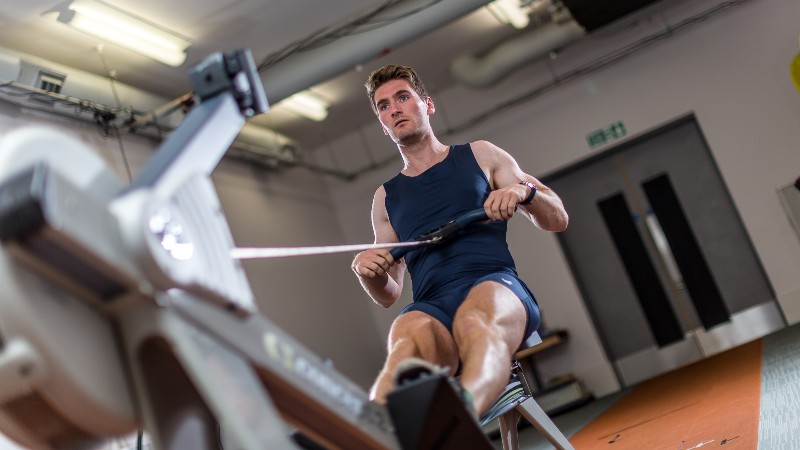Why sleep is so important for the performance and recovery of athletes

Paul Hough is a lecturer in Sport and Exercise Science at Oxford Brookes University, and on World Sleep Day 2022 he outlines the importance of sleep for athletes’ performance and recovery.
Paul is currently researching how sleep affects physical performance for his PhD and has recently completed a study which focused on how sport scientists and other practitioners monitor sleep with high-level athletes.
On World Sleep Day 2022, Paul answers some of the most common questions associated with the connection between the importance of sufficient sleep and performance.
What determines when we fall asleep?
Paul: “Sleep is regulated by two factors: homeostatic and circadian. The homeostatic factor is the time elapsed since you last slept, which increases during sustained wakefulness.
“The circadian factor is influenced by the time of day and specifically your exposure to light. There is an increasing sleep tendency that occurs during the darkest part of the 24-hour day. Hence, why you might feel more tired in the early evening in December than you would in June.”
Is sleep important for immune function?
Paul: “Sleep is important for maintaining a well functioning immune system. When we become ill or suffer an injury, this causes inflammation, which is a natural immune response to help the body fight infection and repair tissues. Some studies show that sleep deprivation (not sleeping for 24 hours or more) and sleeping less on a regular basis is associated with higher markers of inflammation and this can potentially weaken our immune response.”
Why do fitness coaches recommend sleeping more?
Paul said: “Several hormonal responses occur before and during sleep, which can influence important physiological restorative processes, such as muscle growth and repair. For example, the majority growth hormone, which influences muscle growth and repair, is produced during non-rapid eye movement sleep.
“Therefore, there is a strong physiological rationale for optimising sleep to promote physiological recovery after sport and exercise.”
Why do I forget things when I am tired?
Paul: “Research shows that insufficient sleep has detrimental effects on various aspects of cognitive function, such as attentional processing, working memory, memory encoding and various factors involved in learning. Hence, why you might find it difficult to retain information or concentrate on a task when you have not slept well.”
Why do some people function better in the morning than others?
Paul: “Humans typically have a preference for when they prefer to wake and sleep; this is referred to as ‘chronotype’. Those who prefer to wake and perform activities in the early morning are classified as early chronotypes (aka larks) and individuals who prefer to function later in the day are classified as late chronotypes (aka night owls). People in between are intermediate chronotypes.
“Your chronotype is largely determined by genetic factors, but it can be modified over time. For example, if you have young children you may transition towards becoming an early chronotype!”
What other benefits are there to a sufficient sleeping pattern for day to day life?
Paul: “Your body has an internal clock that regulates our physiology and behaviour; these 24-hour cycles are known as circadian rhythms. Circadian rhythms influence bodily functions, such as digestion and body temperature. A most important and well-known circadian rhythm is the sleep-wake cycle. Sleeping at irregular times can disrupt the body's sleep-wake cycle and reduce sleep quality.
“A classic example of this disruption occurs with jetlag, when your body clock is not ‘set’ to the time of your destination. When our circadian rhythms are dysregulated, this increases our susceptibility to illness and poor health. Therefore, it is a good idea to maintain a relatively consistent bed and wake time as this helps to regulate your body clock.”
How beneficial are short sleeps or naps during the day time?
Paul said: “Children have a longer sleep requirement than adults and often need to take naps during the day. Short (20-30 minute) naps can also be beneficial for adults in improving cognitive and physical performance, particularly if you slept poorly the night before. As mentioned previously, sleep is important for immune function so taking naps can be beneficial if you are unwell.
“The timing of naps is very important. You should avoid napping too close to your bedtime (usually after 2pm) as this can make it more difficult to fall asleep, so the short term benefits of a nap can be overshadowed. Also, it’s a good idea not to perform a task straight after waking from a nap. Instead, allow a 30 minute window to ‘wake-up’ after a nap. Finally, you should avoid napping during the day if you are experiencing insomnia (trouble sleeping at night).”
The paper ‘Monitoring athletes sleep: a survey of current trends amongst practitioners’ is published in ‘The Journal of Sport and Exercise Science’.
The paper is authored by Paul A. Hough, Jamie S. North, Stephen D. Patterson and Charles R. Pedlar
